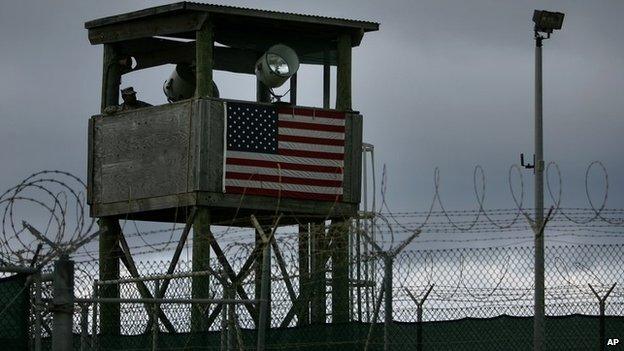CIA interrogations report sparks prosecution calls
- Published
A Senate report accuses the CIA of employing 'brutal' interrogation tactics in response to the 9/11 attacks. The BBC looks at the key numbers in the report.
The UN and human rights groups have called for the prosecution of US officials involved in what a Senate report , externalcalled the "brutal" CIA interrogation of al-Qaeda suspects.
A top UN human rights envoy said there had been a "clear policy orchestrated at a high level".
The CIA, external has defended its actions in the years after the 9/11 attacks on the US, saying they saved lives.
President Barack Obama said it was now time to move on.
The summary of a larger classified report says that the CIA carried out "brutal" interrogations of al-Qaeda suspects in the years after the 9/11 attacks on the US and misled other officials about what it was doing.
The information the CIA collected this way failed to secure information that foiled any threats, the report said.

Key findings:
None of 20 cases of counterterrorism "successes" attributed to the techniques led to unique or otherwise unavailable intelligence
The CIA misled politicians and public
At least 26 of 119 known detainees in custody during the life of the programme were wrongfully held, and many held for months longer than they should have been
Methods included sleep deprivation for up to 180 hours, often standing or in painful positions
Saudi al-Qaeda suspect Abu Zubaydah was kept confined in a coffin-sized box for hours on end
Waterboarding and "rectal hydration" were physically harmful to prisoners, causing convulsions and vomiting

UN Special Rapporteur on Human Rights and Counter-Terrorism Ben Emmerson said that senior officials from the administration of George W Bush who planned and sanctioned crimes must be prosecuted, as well as CIA and US government officials responsible for torture such as waterboarding.
BBC North America editor Jon Sopel speaks to report author Dianne Feinstein
"As a matter of international law, the US is legally obliged to bring those responsible to justice," Mr Emmerson said in a statement made from Geneva, external.
"The US attorney general is under a legal duty to bring criminal charges against those responsible."
Human Rights Watch executive director Kenneth Roth said that the CIA's actions were criminal, external "and can never be justified".
"Unless this important truth-telling process leads to prosecution of officials, torture will remain a 'policy option' for future presidents," he said.
The American Civil Liberties Union (ACLU) argued that the attorney general should appoint a special prosecutor to conduct a full investigation.
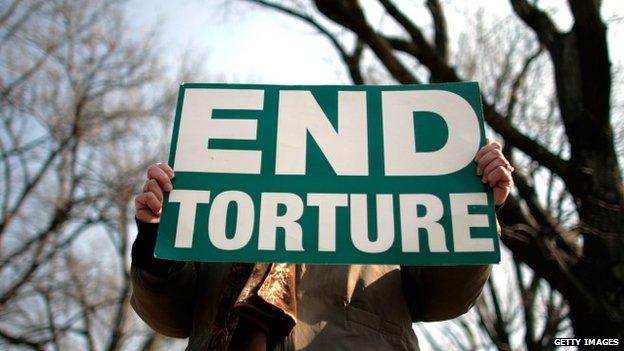
There have been reservations in the US about the use of torture against terror suspects for many years

The report accuses US intelligence agencies of using "extraordinary rendition" to send terror suspects for questioning in countries where they had no legal protection or rights under American law
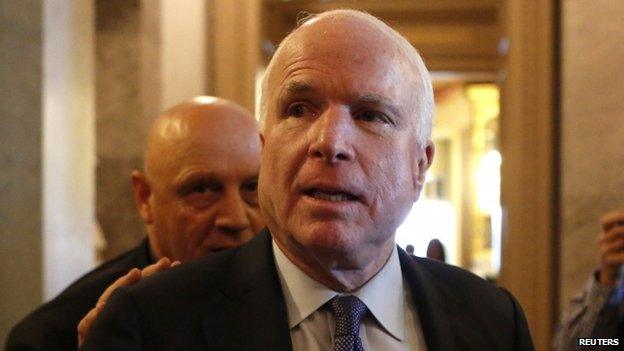
John McCain said that the abuse of prisoners produced more bad than good intelligence
Mr Obama said on Tuesday that he hoped that the publication of the report would not lead to a re-fight of old arguments, but "help us leave these techniques where they belong - in the past".
He banned harsh interrogation techniques after taking office in 2009.
Correspondents say that the chances of prosecuting members of the Bush administration are unlikely, not least because the US justice department has said that it has already pursued two investigations into mistreatment of detainees since 2000 and concluded that the evidence was not sufficient to obtain a conviction.
Influential Republican Senator John McCain argued that torture "rarely yields credible information" and that even in the hunt for Osama Bin Laden the most important lead came from "conventional interrogation methods".
Speaking on Telemundo, President Obama said he felt that some of the techniques used amounted to torture
Some Republicans on the Senate Intelligence Committee released a minority report, accusing the Senate report of having a "flawed analytical methodology", "inadequate objectivity" and "political considerations".
The CIA has argued that the interrogations had helped save lives.
"The intelligence gained from the programme was critical to our understanding of al-Qaeda and continues to inform our counterterrorism efforts to this day," director John Brennan said.
However, the CIA also acknowledged mistakes in the programme, which was known internally as Rendition, Detention and Interrogation and took place from 2002-07.
Introducing the report to the Senate, Intelligence Committee Chairwoman Dianne Feinstein described the CIA's actions as a "stain on US history".
None of the countries where the so-called black sites were identified in the report, but several countries suspected to have hosted sites reacted strongly to the publication.

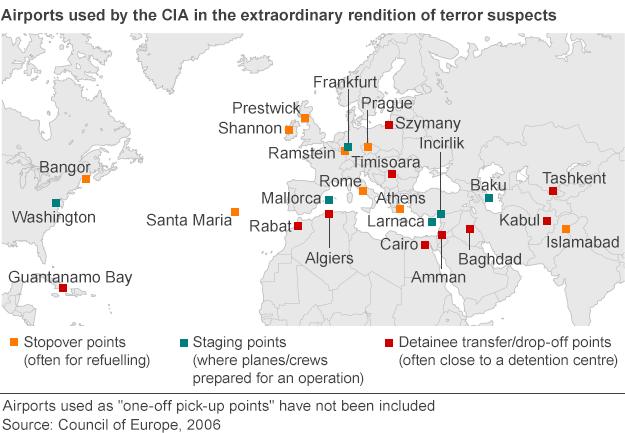
Poland's former president has publicly acknowledged for the first time his country hosted a secret CIA prison.
Aleksander Kwasniewski said that he put pressure on the US to end brutal interrogations at the prison in 2003.
"I told Bush that this cooperation must end and it did end," Mr Kwasniewski told local media.
Lithuanian Prime Minister Algirdas Butkevicius called on the US to say whether CIA used his country to interrogate prisoners.
A previous Lithuanian investigation found the CIA set up and ran a facility near the country's capital but could not determine if prisoners were held there.
And Afghanistan's President Ashraf Ghani called the report "shocking", saying the actions "violated all accepted norms of human rights in the world".
- Published9 December 2014
.jpg)
- Published9 December 2014
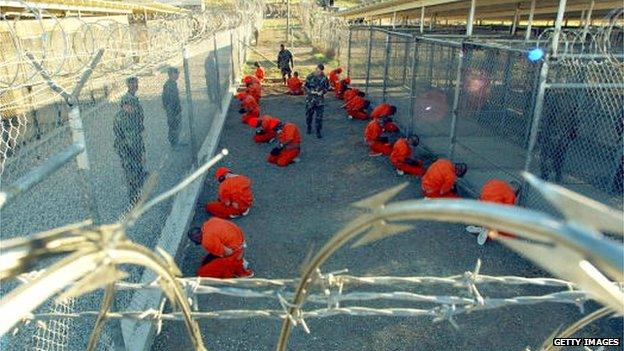
- Published9 December 2014
